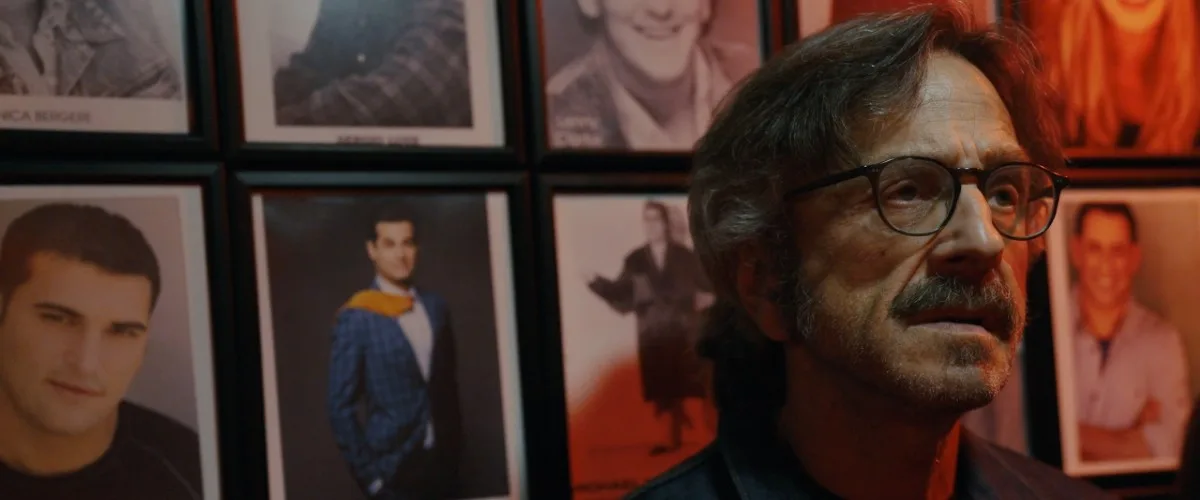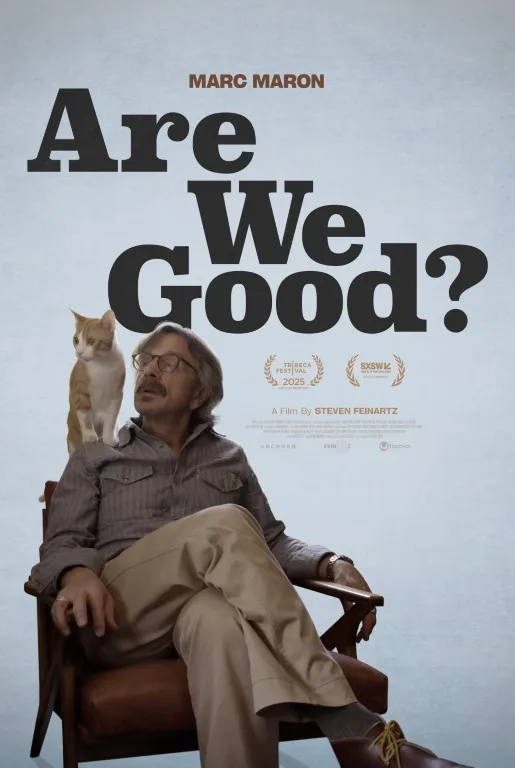Actor, comic, and podcaster Marc Maron‘s integrity has long been his second most vital selling point, following his gift for blunt-spoken but compassionate humor. We get plenty of both in “Are We Good?”, a documentary about Maron in the years following the death of his partner, director Lynn Shelton, from acute myeloid leukemia, which, by his own admission, set him adrift. The most fascinating parts of Maron’s podcasts haven’t been the interviews—which are excellent—but his ruminative monologues about whatever passes through his mind, including what’s been happening to him off-mic and off-camera.
Oddly, however, this movie, directed by Steven Feinartz, can’t quite break through Maron’s tortoise-like carapace. There’s a substantive one-on-one talk between the director and Maron specifically focused on the loss of Shelton, in which the subject speaks with his characteristic embittered honesty. This continues until Maron’s cat shows up and breaks the momentum, giving him permission to be jokey rather than baring his soul. He seems relieved.
The interplay between filmmaker and subject takes center stage . That will disappoint anyone hoping for catharsis, or even a display of vulnerability in which Maron himself doesn’t set the parameters. In fairness, Maron doesn’t provide Feinartz with the raw material to make the kind of movie it seems he wanted to make. We get the feeling that, over the course of participating in the project, Maron realized that he and the filmmaker were not an ideal match.
At one point, Steinartz tells Maron that the movie will animate still photographs to help tell the story, and Maron warns him against it because “I’ve never seen it not be hokey.” Steinartz does it anyway. When you see then, you realize that it’s not right for a film about Maron, who makes a point of not doing the obvious or fashionable thing with his comedy, his acting, or anything he involved with. There’s also a moment backstage at the Comedy Store where a nervous Maron is waiting to go on and seems to have difficulty restraining himself from telling the filmmaker to leave him alone. He tells Steinartz that he’s pushing him away, but doesn’t actually get that aggressive, turning his back instead. But the effect is the same: he’s communicating that he’s just not into this.
The movie doesn’t rise to anywhere near the level of the influential 1967 documentary “Don’t Look Back,” which shows its subject, the young and suddenly world-famous Bob Dylan, sparring with reporters, fans, and even (from a distance) his own colleagues (specifically Donovan). The main difference is that the Dylan doc is entirely done in a “fly on the wall” style, simply observing the singer during a tour of England and letting us decide what we think of him. It doesn’t try to push past his defenses and uncover the “real” Dylan, putting him in some kind of context, an impossible task given that he’s been an enigma for sixty years. This movie, in contrast, seems like a proposed collaboration that instead became a documentary of a partnership that only one person wants to belong to.,
This site’s founder was not impressed with Dylan as seen through director D.A. Pennebaker’s lens; revisiting the movie in a restored version, Roger Ebert wrote, “What an immature, self-important, inflated, cruel, shallow little creature, lacking in empathy and contemptuous of anyone who was not himself or his lackey.” Maron comes off far more sympathetically, which isn’t hard to do considering that, while another podcaster describes Maron as “an asshole,” he never comes across that way. He seems more like a gifted but cranky guy who’s basically decent, honest with himself and others, and not inclined to pick fights unless he’s genuinely offended by someone or something (as when he recently blasted fellow comics as hypocrites for posturing about free speech but taking money from Saudi Arabian royals, who run a dictatorship).
Still, there’s a unique evolving energy radiating from him in this movie—that of a famous artist saying yes to a colleague’s request to make a movie about him and realizing it was a bad idea, but being unable to simply bow out. Either he didn’t want to hurt the guy’s feelings or affect the production. That’s an intriguing predicament, but one that a Marc Maron monologue would better serve.




















